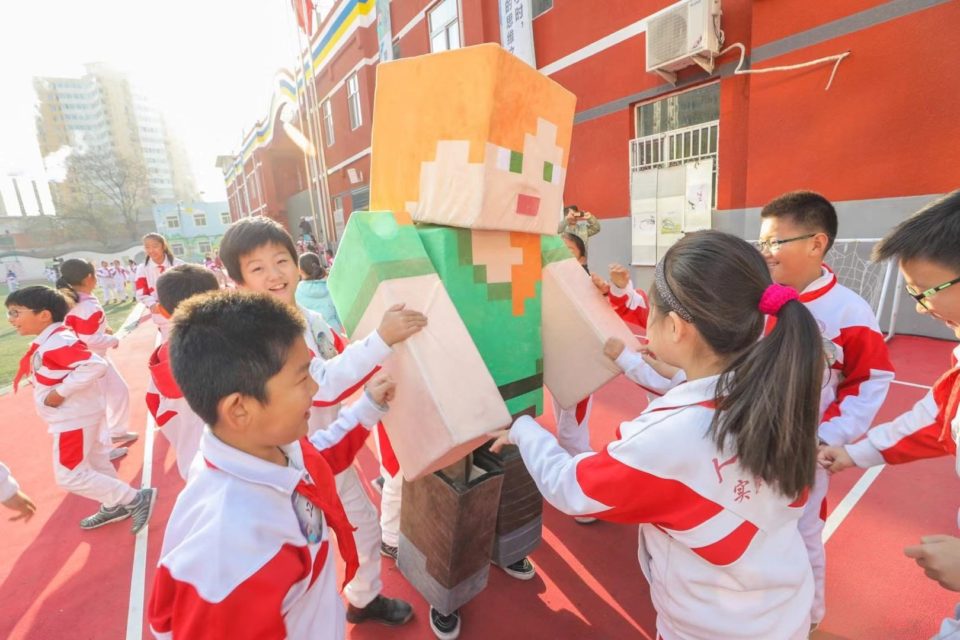By Dr. Daiana Beitler, Philanthropies Lead, Microsoft Asia.
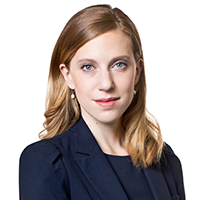 Computer scientist and entrepreneur, Sebastian Thrun, once said that mathematics, computer science and the arts are intimately related as they are all creative expressions. And if you had the opportunity to peer into the world that 16-year old Indonesian student, Michael Hamonangan Sitorus, created in Minecraft: Education Edition, I’m sure you will find it hard to disagree.
Computer scientist and entrepreneur, Sebastian Thrun, once said that mathematics, computer science and the arts are intimately related as they are all creative expressions. And if you had the opportunity to peer into the world that 16-year old Indonesian student, Michael Hamonangan Sitorus, created in Minecraft: Education Edition, I’m sure you will find it hard to disagree.
From the sprawling, sacred ground of the Borobudur Temple to the awe-inspiring tower of the Monumen Nasional, Michael recreated these wondrous landscapes in the virtual world of Minecraft to showcase Indonesia’s history.
By combining his coding skills and creativity, Michael won over the hearts of the judges to emerge as the champion of the Asia Pacific’s Next Top Coder, an online competition led by Empire Code in partnership with Microsoft and Lenovo.
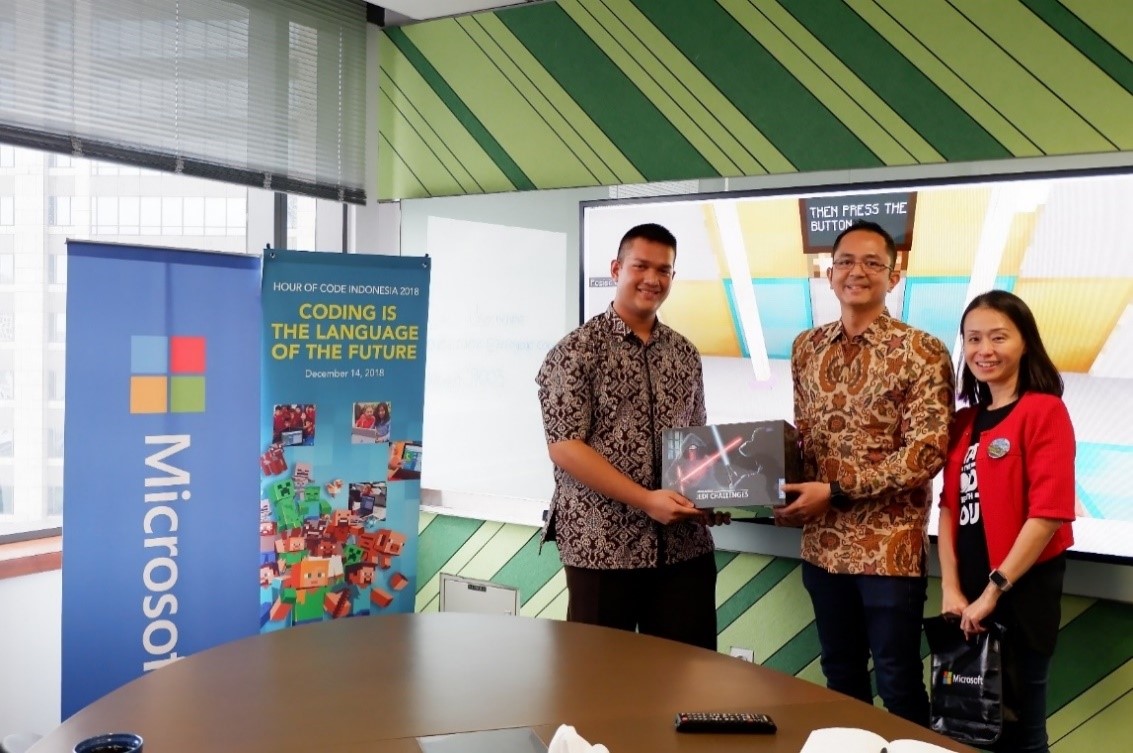
Michael is one of the 350,000 students engaged in more than 740 events in December 2018 in Asia during Microsoft’s Future Ready Campaign, an initiative aimed at igniting the interest of students in computer science while building the capabilities of educators from all disciplines to impart these skills.
Creating a better future requires creativity in the present
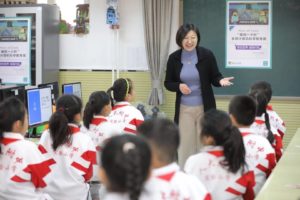 The overwhelmingly huge momentum created by this campaign reverberated across every country in Asia. Up north, Microsoft China partnered with government, non-profits and retailers, to train more than 450 educators and 150,000 students. A key event was the 6th National Youth Electronic Information and Intelligence Innovation Competition, which encouraged students to create virtual worlds using KODU game lab.
The overwhelmingly huge momentum created by this campaign reverberated across every country in Asia. Up north, Microsoft China partnered with government, non-profits and retailers, to train more than 450 educators and 150,000 students. A key event was the 6th National Youth Electronic Information and Intelligence Innovation Competition, which encouraged students to create virtual worlds using KODU game lab.
Similarly, a series of country-wide hands-on activities in Vietnam and the Philippines, culminated in hackatons that required students to get creative and apply skills to address challenges such as a disaster response.
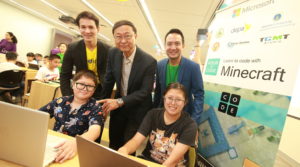 In Thailand, we partnered with the Ministry of Digital Economy and Society to launch the first Thai cartoon character coding tutorial. The initiative was extended to 13 provinces across the country using Skype. In Indonesia, the Hour of Code was broadcasted live reaching 700 students across 18 schools.
In Thailand, we partnered with the Ministry of Digital Economy and Society to launch the first Thai cartoon character coding tutorial. The initiative was extended to 13 provinces across the country using Skype. In Indonesia, the Hour of Code was broadcasted live reaching 700 students across 18 schools.
Korea adopted a slightly different approach. Here, “Future Ready Voyage-Finish” was designed as a family event where both youth and parents had the opportunity to learn computer science in alignment with the education initiatives of the Korean government.
Teaching is the one profession that creates all other professions
As the people who are nurturing our next generation, educators are in the best position to ignite students’ interest in computer science. I firmly believe that when educators – from any discipline – engage in computer science lessons, they are not just imparting coding skills, they teach creativity, computational thinking, and problem-solving, some of the top skills that people need to thrive in the workplace in 2020 and beyond. Yet another significant accomplishment for this campaign was successfully training more than 6,000 teachers on high-quality computer science education.
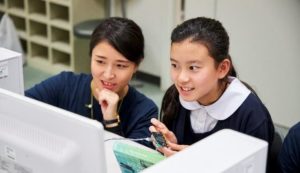 I’m incredibly proud that in Japan 151 of our employees volunteered to engage educators all across the country, getting them ready for the introduction of computer science in national curricula by 2020. This is part of a collaboration with Windows Digital Life Consortium’s MakeCode, using the micro:bit curriculum.
I’m incredibly proud that in Japan 151 of our employees volunteered to engage educators all across the country, getting them ready for the introduction of computer science in national curricula by 2020. This is part of a collaboration with Windows Digital Life Consortium’s MakeCode, using the micro:bit curriculum.
Sustaining this momentum further, in India, Microsoft partnered with three nonprofits to introduce teachers and underserved youth to computer science across 14 states and in Hong Kong, we empowered more than 3,000 teachers through the Teaching & Learning Expo, Microsoft Education Technology Day, and Special Schools Professional Development Symposium.
Advancing a Future for Everyone through Computer Science Education
In the recent World Economic Forum at Davos, our CEO, Satya Nadella, discussed why data will be like electricity, ubiquitous and essential for driving economic growth and productivity.
However, over half of the people in the world today lack the basic access to the knowledge and skills that would enable them to participate in this new digital economy.
A defining challenge of our time is ensuring that everyone, especially the future generation, is equipped to reap the benefits that technology can bring. Together with our partners, we are working to ensure our computer science initiatives get translated into long-term, systemic change, leaving no one left behind.
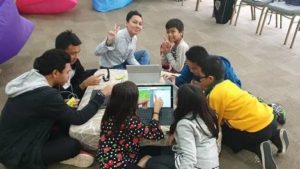 In Malaysia, we partnered with numerous organizations to offer underserved youth including refugees, young women, and children with special needs an opportunity to engage with computer science. In Nepal and Brunei, Team SochWare, Imagine Cup 2018 world finalists, shared their personal experience and passion for computer science to inspire students in remote areas.
In Malaysia, we partnered with numerous organizations to offer underserved youth including refugees, young women, and children with special needs an opportunity to engage with computer science. In Nepal and Brunei, Team SochWare, Imagine Cup 2018 world finalists, shared their personal experience and passion for computer science to inspire students in remote areas.
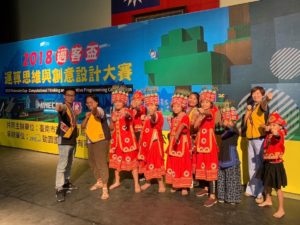 Empowering students from Indigenous communities was a key focus in a few countries. In Taiwan, Microsoft partnered with the local government to host the first national Minecraft competition, where over 600 students showcased their take on Taiwan’s indigenous culture using Minecraft: Education Edition. The new Minecraft Hour of Code tutorial, Voyage Aquatic, has been translated into Māori for New Zealand, and in Australia, we ran an Hour of Code week in schools as part of the Njulgang Digital Skills Program for Indigenous Students across Western Sydney.
Empowering students from Indigenous communities was a key focus in a few countries. In Taiwan, Microsoft partnered with the local government to host the first national Minecraft competition, where over 600 students showcased their take on Taiwan’s indigenous culture using Minecraft: Education Edition. The new Minecraft Hour of Code tutorial, Voyage Aquatic, has been translated into Māori for New Zealand, and in Australia, we ran an Hour of Code week in schools as part of the Njulgang Digital Skills Program for Indigenous Students across Western Sydney.
We believe technology is a force for good, and it should be an equalizing force in the world – inclusive, not divisive. And therefore, we are committed to ensuring that everyone, no matter their background and condition, has access to the benefits it provides.


